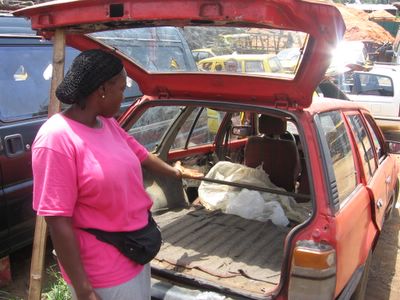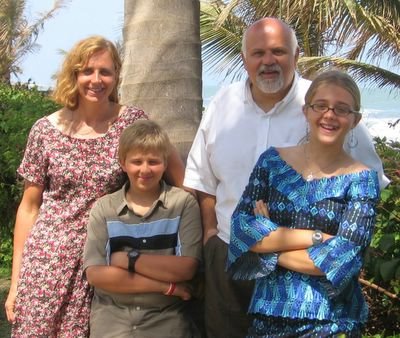Hi folks, this is Renita Reed online. Bob usually does this blog thing, but for the next couple entries, I thought I’d give you Liberia through my eyes. For several months I’ve been thinking about introducing you to people I serve in my work with LEAD, and today I decided to do it.
As some of you know, Liberia’ economy was virtually destroyed through twenty years of civil strife, corruption and war. Liberia is recovering, but unemployment is still around 85%, and most Liberians engage in a routine to make enough money for food for just that day. In the interior, away from populated areas, the daily activities are subsistence farming, fishing and hunting. In the cities, thousands set up roadside shops, selling canned goods, used tires, plantains, medicine, soap, soccer balls, fresh and dried fish, rice and beans by the cup, flip-flops, phone cards, and most anything else one might imagine. Children are enlisted by parents to roam their communities selling homemade food items. Bob has told you about little Ishmael and Sam. I'd like to introduce you to two business owners, both of whom are in our current LEAD business class.
Monday, June 05, 2006
 Beatrice
BeatriceThe first is Beatrice, who owns a business called "Mother and Son". She ran a used clothing business which was destroyed in the 2003 war, and has since started a cold water business. Every day, she buys 50 containers of purified cold water, each container holding 30 half liter bags for a total of 1500 bags. These bags are purchased by smaller retailers who run up and down the road calling “co’ wa’ co’ wa' co’ wa’,” to passengers in cars or pedestrians. Each bag sells for 5 Liberian dollars (about 10 US cents). After President Sirleaf’s inauguration, the Liberian Government announced that markets were too close to the streets and had to be moved back at least six feet. Businesses were given three months to do this, although provisions for new market space were not readily provided. Those who did not comply had their structures torn down by the police. Beatrice lost her market space and has now set up an umbrella further back from the road, and further back from her primary client—thirsty taxi drivers. If she does not sell all of her bags of water she no longer has a shack to store her inventory, so she is borrowing space in the trunk of a broken down station wagon next door. Beatrice did not go very far in school and is working hard to learn what she can from LEAD; she is very positive about the future. She hopes to use the money from the loan of LEAD to build a permanent, safer structure for her inventory, as well as invest in additional capital for her business, including a freezer to keep the water cold.
Moses
Moses is a member of Providence Baptist Church and owns a charcoal business. The vast majority of Liberians cook with charcoal and so business is always booming. But the work is dirty, extremely labor intensive, and the profit margin is small. Moses goes into the bush to cut down trees, saw limbs, and pile the wood to burn to make his own charcoal, and then transports it back to the city to sell it. Transportation of charcoal is a challenge, as Moses does not own a vehicle and is therefore at the mercy of whatever truck he can hire (another booming but low profit business) to transport the charcoal back to his shack. In addition, his business is situated a mile away from the main road, serving a village away from bigger market areas; Moses has to hire young men with wheelbarrows to carry the bags of charcoal from the truck back to his business. A bigger challenge is keeping the charcoal dry; most of you know how frustrating it is to start wet charcoal, and Moses knows that if he sells wet charcoal, his customers will not come back. Days before we visited his business, a tropical storm came through Liberia and took the roof off of the mat structure where he was storing his charcoal. He now gives up a portion of his very small home to store his charcoal in order to keep it dry. Moses hopes his LEAD loan will help him put corrugated zinc on the roof of his business to keep his charcoal dry, open a second market place, and a future dream is to purchase a vehicle.
Beatrice and Moses are typical of thousands of Liberians attempting to put food on their families’ tables through their micro-businesses. With your help, LEAD is working with Beatrice and Moses to develop and expand their livelihood. Their dream—LEAD’s-- is that as their businesses grow, they will be able to employ other Liberians as well.
Moses is a member of Providence Baptist Church and owns a charcoal business. The vast majority of Liberians cook with charcoal and so business is always booming. But the work is dirty, extremely labor intensive, and the profit margin is small. Moses goes into the bush to cut down trees, saw limbs, and pile the wood to burn to make his own charcoal, and then transports it back to the city to sell it. Transportation of charcoal is a challenge, as Moses does not own a vehicle and is therefore at the mercy of whatever truck he can hire (another booming but low profit business) to transport the charcoal back to his shack. In addition, his business is situated a mile away from the main road, serving a village away from bigger market areas; Moses has to hire young men with wheelbarrows to carry the bags of charcoal from the truck back to his business. A bigger challenge is keeping the charcoal dry; most of you know how frustrating it is to start wet charcoal, and Moses knows that if he sells wet charcoal, his customers will not come back. Days before we visited his business, a tropical storm came through Liberia and took the roof off of the mat structure where he was storing his charcoal. He now gives up a portion of his very small home to store his charcoal in order to keep it dry. Moses hopes his LEAD loan will help him put corrugated zinc on the roof of his business to keep his charcoal dry, open a second market place, and a future dream is to purchase a vehicle.
Beatrice and Moses are typical of thousands of Liberians attempting to put food on their families’ tables through their micro-businesses. With your help, LEAD is working with Beatrice and Moses to develop and expand their livelihood. Their dream—LEAD’s-- is that as their businesses grow, they will be able to employ other Liberians as well.
Subscribe to:
Comments (Atom)




